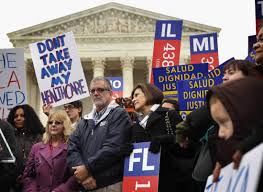6/25/2015

The Supreme Court delivered the much-anticipated King vs. Burwell decision on Thursday not to strike down a key portion of the Affordable Care Act (ACA), or Obamacare. The 6-3 decision means that enrollees in states which have not set up their own health exchanges will continue to receive federal subsidies for health insurance. Currently, 34 states have not set up exchanges while only 16 states and the District of Columbia have. Had the Court decided the other way, it could have potentially disabled much of the ACA due to lack of funding, and would have left 6.4 million current enrollees without healthcare. Chief Justice John Roberts, along with Justice Kennedy and the four liberal Justices concurred, while Justices Scalia, Alito, and Thomas dissented. Chief Justice Roberts penned the majority opinion, writing “Congress passed the Affordable Care Act to improve health insurance markets, not to destroy them. If at all possible, we must interpret the Act in a way that is consistent with the former, and avoids the latter.” In his dissent, Justice Scalia wrote, “we should start calling this law SCOTUScare,” given that the Court has now ruled twice on measures that have likely saved the ACA. Experts have tended to agree that the loss of those enrollees would have led to skyrocketing premiums and likely a lack of sustainability for a large part of the program.
The case is a clear example of the power of words. The argument against the subsidies was based on four words in the legislation, “Established by the state,” and whether those words mean only resident of states with exchanges can take part in Obamacare, or if the federal subsidies was a sufficient actor for the state. The Court sided with the latter, that Congress’s intent for the ACA was to provide Americans with health coverage, not to subject it to regional politics or the will of state-level authorities. Attorney Michael Carvin, argued for the challengers, saying “If the rule of law means anything, it is that text is not infinitely malleable, and that agencies must follow the law as written—not revise it to ‘better achieve’ what they assume to have been Congress’s purposes.”Solicitor General Donald B. Verrilli, Jr. was likely the key factor in persuading the court to rule as it did however; arguing the consequences if the law was struck down over the language. Verrilli argued that a reversal “would face the very death spirals the Act was structured to avoid and insurance coverage for millions of their residents would be extinguished.” Lower courts were split on the case, with the U.S. Court of Appeals for the District of Columbia invalidating the subsidies and the Fourth Circuit Court of Appeals ruling in favor of the current structure. Had the words been interpreted differently by the Court, Congress would likely have had to pass a rewrite of that section, which would never happen in either house of the Republican-led Congress.
Although the ruling is certainly a win for President Obama, the affected enrollees, and other supporters, many Republicans are likely quietly thanking their lucky stars today as well. Several congressional aides acknowledged that the politics of victory would be much more difficult to manage than if the ruling upheld the status-quo. A recent Rand Corporation poll showed that for the first time, a majority of Americans support Obamacare, and that those that would lose coverage would pin the blame squarely on Republicans. As a fall-back, Republicans in the House of Representative recently passed legislation that would eliminate the 2.3 percent medical device tax included in the ACA as well as eliminate the Independent Payment Advisory Board (IPAB), which has been construed by some in the media to be “death panels,” from the legislation. Garnering a fair amount of bipartisan support, including Democrats from states with a high concentration of device manufacturing, citing that the tax curtails innovation and that the IPAB, which has yet to be implemented, as being virtually irrelevant and perhaps too controversial. The bill, which has moved to the Senate, is an encouraging example that Republicans will move to try to improve Obamacare as opposed to the dozens of failed attempts to repeal the law in its entirety, a move that could marginalize the party from a great number of affected constituents. The Court’s ruling should solidify the trend, although Republicans will likely use Obamacare repeal as a campaign fodder for years to come, although at this point it will likely remain as lip-service only.
Sources:
CNN – Ariane de Vogue
Yahoo Politics – Liz Goodwin and Meredith Shiner


Join the conversation!